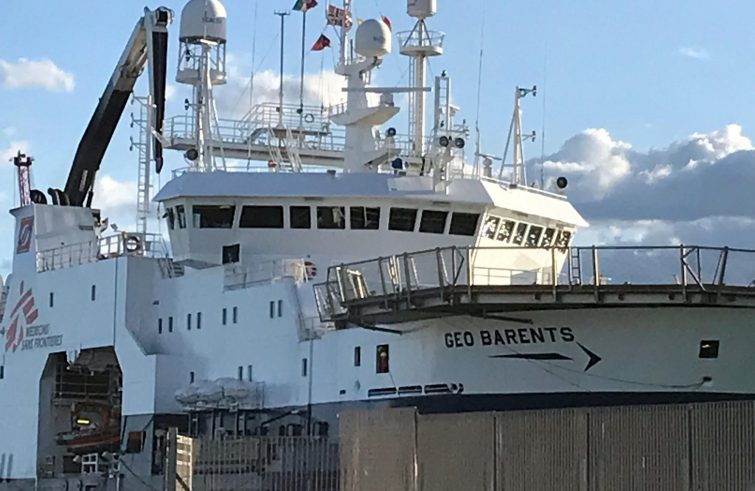
“We hope the matter will be resolved quickly because these people’s psychological conditions are sorely tried, and that new reception mechanisms will be put in place at European level – not limited to the voluntary commitment of certain countries only, but based on pre-determined criteria that protect the migrants first of all and then the individual States”. Paolo Beccegato, acting deputy director of Caritas Italy, head of its International Division, comments on the case of the humanitarian rescue ships with shipwrecked migrants aboard operated by the NGOs Humanity 1 and Geo Barents that arrived in the port of Catania between Saturday and Sunday, still stranded in the Sicilian city. In fact, 35 people are still on board the first vessel, after a total of 144 disembarked because they are deemed to be “fragile.” But there are still 215 people on board humanitarian vessel Geo Barents, run by Doctors Without Borders.
Mr. Beccegato, what is your assessment of this situation?
First of all, I would like to contextualise it within a global context, which in itself is quite unique. While it is true that similar incidents have already occurred in the past, it is also true that we are seeing a dramatic increase in the number of refugees- over 100 million so far.
These people represent a litmus test of what is happening in the world. I am thinking in particular of the rising number of wars, their impact on civilians and the damage caused by the climate emergency.
For example, right now we are witnessing a humanitarian catastrophe in sub-Saharan Africa afflicting the entire Sahel belt and extending as far as the horn of Africa. These persons are leaving their homes not simply because they want to improve their lives, but because in their homeland there is no future for them, there is no life, indeed there is death. These people are forced to leave their homeland, either out of famine, or violence, or because of very serious violations of basic human rights.
With regard to the specific case of Catania
It is our understanding that the vast majority of the people aboard those vessels are men and women, not counting the youngest, who underwent terrible violence both in the countries of origin and in those of transit, as far as Libya. Therefore, they are in fact people scarred by extreme fragility as well as by various disorders. I believe that showing preference and applying selective criteria in terms of reception is, in the first place, extremely difficult to implement and also inherently discriminating. Moreover, even if it were understandable from a logical point of view, or if it made sense, in this case it strikes me as wrong because we are dealing with people marked by extreme, severe difficulties.
What do you think of the current clash between the Italian State and the NGOs?
First of all I see two contradictions. The first is that if Eastern Europe has not refused to take in refugees from Ukraine, and we are all Europeans, I don’t see why Southern Europe should pull back when the emergency arrives from elsewhere and it is up to it to take action. Loftier criteria must prevail, starting with solidarity
Secondly, on the subject of NGOs, I must point out that we are talking about non-profit organisations, not about governmental bodies or structures. The NGOs are generally ‘the best’ of what each country can offer in the areas of solidarity, of welcome, both at a national level – when they operate to help local poor people – and at an international level, when they cater to the needy worldwide. Solidarity has no borders.
On the contrary, what we see is that governments often tend to capitalise on the contribution offered by civil society, which is deemed useful and praiseworthy when it helps their own poor, reprehensible or subject to limitation when it no longer suits their interests. It should be stressed once again that NGOs, and all non-profit organisations in general, do nothing more than try to help whoever is experiencing serious difficulties, whether at land or sea, nationally and internationally. There is no need for these clashes. Instead, collaboration is needed in order to identify the most appropriate solution to problems, and avoid creating them.
The Pope called for a shared responsibility of the migrant emergency on the part of all of Europe.
We fully share the Pope’s position and we too firmly believe that there is a need for a Europe-wide reception, whether – I repeat – refugees arrive from the east or from the south. Moreover, Italy cannot and must not be left alone to face this emergency. But this requires a comprehensive – and not a one-sided – understanding of the phenomenon, which at the same time calls for an equally comprehensive response.
What about the situation of the last few hours?
In the specific case of Catania, our first concern is a rapid solution to the crisis. Besides these people’s health and physical problems, their psychological condition is sorely tried and scarred by years of harassment, violence, difficulties and unspeakable suffering.
These persons have put their lives at risk, that is, they even considered the idea of dying, for the sake of putting an end to the terrible situation they were fleeing from.
Secondly, we hope that European reception mechanisms will be put in place, based not only on the voluntary efforts expressed by certain countries, but on previously established criteria, ensuring that the burden of such situations will not be borne by the migrants and refugees and neither by certain countries alone.


